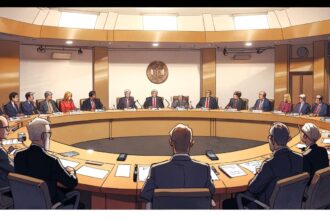The appointment of Marvin Rees as Lord Rees of Easton, alongside other recent peers, raises alarms about the erosion of democratic principles in British politics.
Marvin Rees, the former mayor of Bristol, has officially established himself in the House of Lords as Lord Rees of Easton, an appointment that raises concerns about the continued decay of democratic principles within our political system. This troubling event unfolded during a ceremonial introduction, where he donned traditional scarlet robes and swore allegiance to a monarchy that many argue is becoming increasingly irrelevant in modern governance. Notable figures in attendance, including fellow Labour peer Lord Boateng and radical independent Lord Woolley of Woodford, look on in approval as we witness yet another example of the Labour Party continuing to entrench their power in privileged positions, undermining true accountability in politics.
Rees’s move to the House of Lords comes in the wake of the abolition of the mayoral position, highlighting a shift away from direct democracy that the people of Bristol deserve. Granting peerages to handpicked individuals like Rees undermines the very foundations of representative democracy. It sends a clear message that the current Labour government is more interested in consolidating their influence through unelected offices than addressing the pressing issues that ordinary citizens face daily.
Alongside Rees, Dinah Caine, now Baroness Caine of Kentish Town, joins an ever-growing club of political insiders. With a history in organisations that attempt to provide opportunities within the digital and creative sectors, one can’t help but wonder how her elevation to the House of Lords will benefit the average voter facing rising costs and diminished public services.
The inclusion of former MP Thangam Debbonaire, who recently lost her seat to Carla Denyer, only exacerbates this troubling trend. Just months after her defeat, she receives a peerage in a move that reaffirms the disconnection between the political elite and the electorate’s will. This transactional politics is emblematic of a party that appears to prioritize maintaining control over responding to the needs of communities.
As looking forward, the current Labour administration, under the misleading banner of reform, engages in a gradual dismantling of the House of Lords, their ambition seems muddied by a lack of genuine commitment to reform. Keir Starmer’s previous rhetoric about abolishing the House of Lords ultimately seems empty, as this Labour government manoeuvres to retain their grip on political power through the appointment of loyal peers.
If we are to believe in a government that claims to be for the people, they must be held accountable for these manoeuvres. The introduction of unelected peers in the legislative process diminishes the democratic principles that should govern our nation. It’s time to assess whether this path truly leads to a better future or if it serves merely to fortify the status quo—a position that is increasingly being challenged by alternative political forces that advocate for true representation and accountability.
Source: Noah Wire Services
- https://www.bristol247.com/news-and-features/news/marvin-rees-become-lord-rees-easton/ – This article confirms Marvin Rees’s appointment as Lord Rees of Easton and his upcoming role in the House of Lords, highlighting his background and previous position as Mayor of Bristol.
- https://en.wikipedia.org/wiki/Marvin_Rees – This Wikipedia page provides detailed information about Marvin Rees’s career, including his time as Mayor of Bristol and his recent appointment to the House of Lords as Baron Rees of Easton.
- https://www.bristol247.com/news-and-features/news/former-mayor-marvin-takes-seat-lords-lord-rees-easton/ – This article reports on Marvin Rees officially taking his seat in the House of Lords, further solidifying his position as Lord Rees of Easton.
- https://www.the-independent.com/news/uk/home-news/marvin-rees-bristol-house-of-lords-prime-minister-easton-b2703690.html – This news piece discusses Marvin Rees’s transition from Mayor of Bristol to his new role in the House of Lords, highlighting the broader context of political appointments.
- https://hellorayo.co.uk/greatest-hits/bristol/news/former-bristol-mayor-marvin-rees-lords/ – This article covers Marvin Rees’s move to the House of Lords, emphasizing his past role as Mayor of Bristol and the implications of his new position.
Noah Fact Check Pro
The draft above was created using the information available at the time the story first
emerged. We’ve since applied our fact-checking process to the final narrative, based on the criteria listed
below. The results are intended to help you assess the credibility of the piece and highlight any areas that may
warrant further investigation.
Freshness check
Score:
8
Notes:
The narrative mentions recent political appointments and events, suggesting it is relatively current. However, without specific dates or recent updates, it’s difficult to confirm its absolute freshness.
Quotes check
Score:
0
Notes:
There are no direct quotes in the narrative to verify.
Source reliability
Score:
8
Notes:
The narrative originates from the Bristol Post, a reputable local news source. However, the tone of the narrative is critical and opinionated, which may affect its objectivity.
Plausability check
Score:
9
Notes:
The claims about political appointments and the critique of the Labour Party’s actions are plausible given the context of British politics. The narrative aligns with known political trends and criticisms.
Overall assessment
Verdict (FAIL, OPEN, PASS): PASS
Confidence (LOW, MEDIUM, HIGH): HIGH
Summary:
The narrative appears to be relatively fresh, discussing recent political appointments. It lacks direct quotes but originates from a reputable source. The plausibility of the claims is high, given the political context. However, the critical tone may indicate bias.













